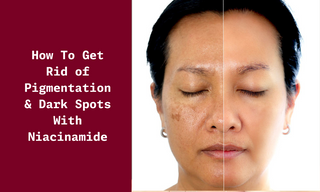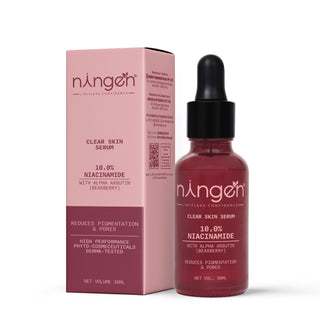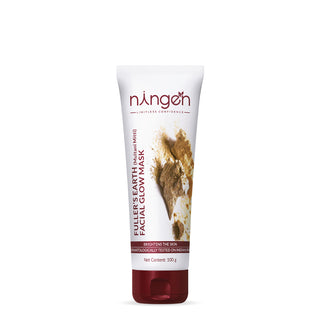Who doesn't want that spotless, lit-from-within glow? We get it, and guess what? We've got the lowdown on a game-changer – Niacinamide!
Skincare can be a maze but don't stress. Today, we're spilling the beans on how Niacinamide can be your secret sauce to that flawless glow.
Dark spots and pigmentation can be stubborn skin concerns that affect people of all ages. Whether caused by sun exposure, aging, or hormonal changes, these hyperpigmented areas can be a source of frustration for many. In the quest for effective solutions, one ingredient has been gaining widespread acclaim in the skincare community – niacinamide.
Whether your spots are from the sun, the ticking clock, or those wild hormones, Niacinamide is like the best friend your skin never knew it needed. So, kick back, grab your drink of choice, and let's discuss how to get rid of pigmentation & dark spots with Niacinamide leaving your skin looking and feeling amazing!
What Are Dark Spots And Pigmentations?
Dark spots and pigmentation refer to areas of the skin that appear darker than the surrounding skin tone due to an accumulation of melanin, the pigment responsible for skin color. These discolorations can manifest in various forms and result from different causes.
Sun-induced Hyperpigmentation:
- Prolonged exposure to the sun's UV rays can stimulate the production of melanin, leading to the formation of dark spots. These are often referred to as sunspots, age spots, or liver spots and commonly appear on areas of the skin that receive the most sun exposure, such as the face, hands, and shoulders.
Post-Inflammatory Hyperpigmentation:
- This type of pigmentation occurs as a response to inflammation or injury to the skin. Conditions like acne, eczema, or wounds can trigger an overproduction of melanin during the healing process, resulting in dark spots or patches.
Hormonal Hyperpigmentation:
- Hormonal changes, particularly during pregnancy (melasma or "pregnancy mask") or due to birth control pills, can lead to increased melanin production, causing pigmentation changes on the face.
Aging-related Hyperpigmentation:
- As the skin ages, cell turnover slows down, and accumulated sun exposure becomes more evident. This can contribute to the development of dark spots and an uneven skin tone.
Understanding the distinction between dark spots and pigmentation is crucial:
- Dark Spots: Typically refer to localized areas of increased pigmentation, often caused by sun exposure or post-inflammatory responses. They can appear as small, concentrated spots on the skin.
- Pigmentation: A broader term encompassing variations in skin color, including dark spots. Pigmentation can involve larger areas and may result from various factors, as mentioned above.
It's essential to differentiate between types of pigmentation to determine appropriate skincare treatments. Consulting with a dermatologist can help identify the specific cause of pigmentation and guide the selection of suitable products or interventions for achieving a more even skin tone.
Types of dark spots (hyperpigmentation, sunspots, post-inflammatory hyperpigmentation)
Dark spots on the skin, known as hyperpigmentation, can stem from various causes, including hormonal changes, aging, sun exposure, and inflammation. Three common types are hyperpigmentation, sunspots, and post-inflammatory hyperpigmentation.
Hyperpigmentation results from excess melanin production, leading to larger, uneven patches. Sunspots, caused by prolonged UV exposure, appear as small, flat, dark spots on sun-exposed areas. Post-inflammatory hyperpigmentation occurs due to skin inflammation or injury, like acne or cuts, resulting in dark spots during the healing process.
Effective treatments include over-the-counter products with ingredients like hydroquinone, retinoids, and vitamin C. Laser therapy, chemical peels, and microdermabrasion help reduce dark spots, especially from sun damage or aging.
Prevention involves sun protection with SPF 30+, seeking shade, and wearing protective clothing. A daily skincare routine with gentle exfoliation and brightening ingredients maintains an even skin tone, reducing the risk of hyperpigmentation.
What is Niacinamide?
Niacinamide, also known as Vitamin B3, is a water-soluble vitamin that plays a crucial role in various physiological processes within the body. When incorporated into skincare products, niacinamide offers a plethora of benefits for the skin. Its versatility makes it suitable for addressing various skin concerns, including dark spots and pigmentation.
Note: Read our other article to know more about Niacinamide and its benefits on the skin. Click on the link.
The Mechanism Behind Niacinamide's Effectiveness
Inhibiting Melanin Production:
- One of the primary ways niacinamide combats dark spots is by inhibiting melanin production. Melanin is the pigment responsible for skin color, and an overproduction of melanin can lead to hyperpigmentation. Niacinamide works by inhibiting the transfer of pigment within the skin cells, helping to regulate melanin synthesis.
Antioxidant protection:
- In addition to its effects on melanosome transfer, niacinamide is also a potent antioxidant. This means that it can help to protect the skin from damage caused by free radicals, which can contribute to the formation of pigmentation. By defending the skin against this damage, niacinamide can help to prevent the development of new pigmentation and reduce the appearance of existing pigmentation.
Anti-Inflammatory Properties:
- Niacinamide boasts anti-inflammatory properties, which are beneficial in reducing redness and inflammation associated with pigmented areas. This can contribute to an overall more even skin tone.
Boosting Collagen Production:
- Collagen is essential for maintaining skin elasticity and firmness. Niacinamide stimulates collagen production, aiding in the repair of damaged skin and promoting a smoother complexion. As a result, the appearance of dark spots may be diminished over time.
Preventing UV-Induced Pigmentation:
- Exposure to UV rays is a significant contributor to dark spots and pigmentation. Niacinamide helps combat UV-induced damage by providing a layer of defense against environmental stressors. Incorporating niacinamide into your skincare routine can be a proactive step in preventing new pigmentation from forming.
Clinical Evidence:
- Numerous clinical studies support the efficacy of niacinamide in addressing dark spots and pigmentation. These studies have demonstrated that regular use of niacinamide can lead to a visible reduction in hyperpigmentation, with improvements noted in both the intensity and size of dark spots. The gentle nature of niacinamide also makes it suitable for various skin types, including sensitive skin.
Incorporating Niacinamide into Your Skincare Routine:
Choose the Right Products:
- Look for serums, creams, or moisturizers that contain a sufficient concentration of niacinamide. Products with a concentration between 2% and 5% are commonly recommended for targeting dark spots and pigmentation.
Consistency is Key:
- Achieving visible results takes time and consistent use. Incorporate niacinamide into your routine and be patient, as improvements may become noticeable over several weeks.
Combine with Other Active Ingredients:
- While niacinamide is potent on its own, combining it with other active ingredients like vitamin C or alpha arbutin may enhance its effectiveness. However, it's essential to gradually patch test and introduce new ingredients to avoid potential skin sensitivities.
Don't Forget Sunscreen:
- Since sun exposure can exacerbate pigmentation issues, using sunscreen is crucial. Niacinamide complements sun protection efforts, making it an excellent addition to your morning skincare routine.
Studies Supporting the Efficacy of Niacinamide in Fading Dark Spots
Niacinamide, also known as vitamin B3, has been shown in several studies to be effective in reducing the appearance of dark spots. One study published in the Journal of Investigative Dermatology found that niacinamide can help to reduce the production of melanin, the pigment responsible for dark spots, resulting in a more even skin tone. Additionally, niacinamide has been shown to have anti-inflammatory properties, which can help to reduce the redness and irritation often associated with hyperpigmentation.
Another study, published in the International Journal of Cosmetic Science, found that a topical formulation containing niacinamide and other skin-brightening ingredients was effective in reducing the appearance of dark spots and overall skin tone improvement. This suggests that niacinamide can be a valuable addition to a skincare routine for those looking to fade dark spots and achieve a more even complexion.
Furthermore, the safety profile of niacinamide makes it an attractive option for those with sensitive skin. Unlike some other ingredients commonly used to address hyperpigmentation, such as hydroquinone, niacinamide is well-tolerated by most individuals and does not carry the risk of irritation or increased sensitivity to sunlight.
Discover our handpicked collection of recommended products featuring Niacinamide in the section below.
Wrapping Up
We hope this article was helpful to you on how to get rid of pigmentation & dark spots with Niacinamide. Niacinamide stands out as a versatile and effective ingredient in reducing dark spots and pigmentation. With its multi-faceted approach – inhibiting melanin production, reducing inflammation, boosting collagen, and protecting against UV damage – niacinamide has earned its reputation as a powerhouse in skin care. By incorporating niacinamide into your daily routine and being consistent, you can unveil a brighter, more even complexion that radiates with confidence and health.
Frequently Asked Questions(FAQ'S)
Question1: What is Niacinamide and how does it help with pigmentation and dark spots?
Niacinamide, also known as Vitamin B3, is a skincare powerhouse that aids in reducing pigmentation and dark spots by regulating melanin production and promoting overall skin health.
Question2: Is Niacinamide suitable for all skin types?
Answer: Yes, Niacinamide is generally well-tolerated by various skin types, including sensitive skin. It is known for its gentle nature and versatility.
Question3: How long does it take to see results when using Niacinamide for pigmentation?
Answer: Results can vary, but noticeable improvements are often observed after consistent use over several weeks. Patience is key in achieving long-term benefits.
Question4: Can I use Niacinamide with other skincare ingredients?
Answer: Absolutely! Niacinamide plays well with many other ingredients. It can be safely combined with antioxidants like Vitamin C or other active ingredients for enhanced skincare benefits.
Question5: Should I use Niacinamide in the morning or evening?
Answer: Niacinamide is versatile and can be used both in the morning and evening skincare routines. It pairs well with sunscreen during the day and complements other nighttime products.
Question6: Can Niacinamide be used alongside prescription skincare for pigmentation issues?
Answer: It's advisable to consult with a healthcare professional or dermatologist before combining Niacinamide with prescription skincare to ensure compatibility and avoid potential interactions.
Question7: Are there any side effects of using Niacinamide?
Answer: Niacinamide is generally well-tolerated, but in rare cases, some individuals may experience mild irritation. Conducting a patch test before widespread use is recommended.
Question8: Can Niacinamide be used on acne-prone skin?
Answer: Yes, Niacinamide is known for its anti-inflammatory properties, making it suitable for individuals with acne-prone skin. It can help with redness and inflammation associated with acne.
Question9: Is there an optimal percentage of Niacinamide in skincare products?
Answer: Products typically contain concentrations between 2% and 5% Niacinamide, which is effective for addressing pigmentation concerns without irritating.
Question10: Can Niacinamide be used during pregnancy or while breastfeeding?
Answer: Niacinamide is generally considered safe for use during pregnancy and breastfeeding. However, it's always recommended to consult with a healthcare professional for personalized advice.









